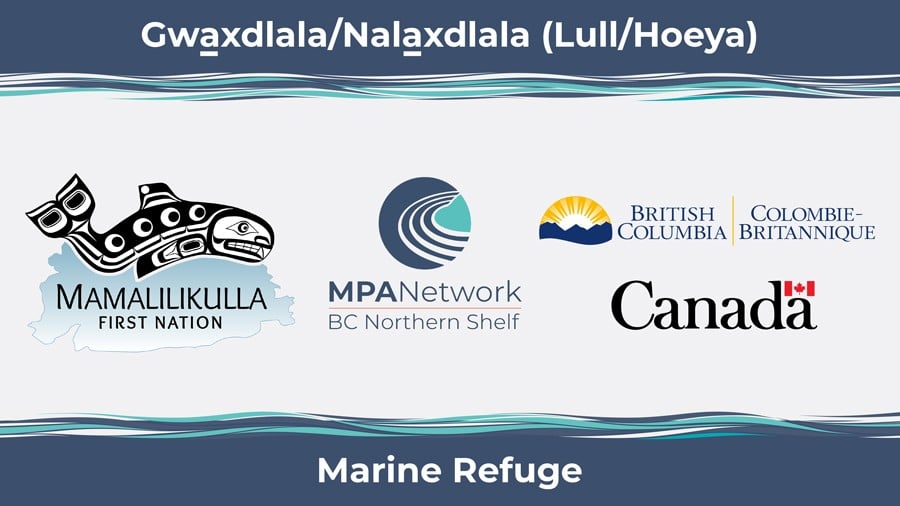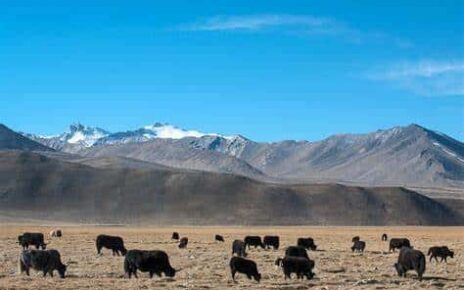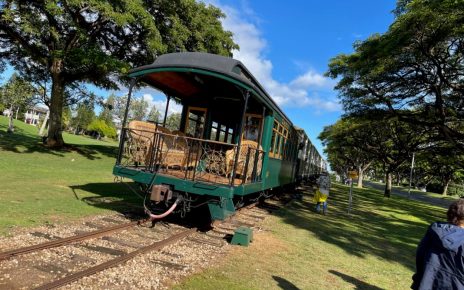Our oceans are vital to the livelihoods of communities across Canada and around the world. Canada announced a Marine Refuge.
Today at the Fifth International Marine Protected Areas Congress (IMPAC5), the Honourable Joyce Murray, Minister of Fisheries, Oceans and the Canadian Coast Guard, Chief John Powell (Winidi) of the Mamalilikulla First Nation, and the Honourable Nathan Cullen, B.C. Minister of Water, Land, and Resource Stewardship announced fisheries closures and the establishment of a marine refuge, to help protect the ecologically and culturally significant area of Gwaxdlala/Nalaxdlala in Knight Inlet on the coast of British Columbia.
As stewards of the longest coastline in the world, it is our shared responsibility to keep our oceans healthy for generations to come. Working in close collaboration with provincial and territorial governments, Indigenous communities, and industry, the Government of Canada is protecting important marine habitats, species, and ecosystems.
These protections are critical to protecting global biodiversity, mitigating impacts due to climate change, and advancing our goal of conserving 25 percent of Canada’s oceans by 2025, and 30 percent by 2030.
Marine refuges are intended to be long-term in nature to help protect important species and habitats. All commercial, recreational Food, Social, and Ceremonial (FSC) fisheries will be closed within the area to prevent impacts from human activity and to ensure full protection of the marine environment.
In consultation with the Mamalilikulla First Nation and the Province of British Columbia, Gwaxdlala/Nalaxdlala – also known as Lull Bay and Hoeya Sound – was identified as an important area that includes a globally unique ecosystem of fragile and slow-growing corals and sponges that provide habitat for more than 240 marine species.
Only by working together at all levels can we achieve Canada’s marine conservation targets to protect 25 percent of Canada’s oceans by 2025.”
It is also identified as an area of high cultural significance by the Mamalililkulla First Nation. Gwaxdlala/Nalaxdlala is the first marine refuge to be recognized through the Northern Shelf Bioregion Marine Protected Area (MPA) Network planning process, and it represents years of work between Canada, the Province of British Columbia, and the Mamalilikulla First Nation.
The Honourable Joyce Murray, Minister of Fisheries, Oceans, and the Canadian Coast Guard said:
The Government of Canada is committed to conserving and protecting Canada’s marine ecosystems for future generations, advancing reconciliation with Indigenous Peoples, and supporting sustainable fisheries management.
The Honourable Nathan Cullen, B.C. Minister of Water, Land and Resource Stewardship added:
“I congratulate the Mamalilikulla First Nation for the stewardship of their coastal waters and protection of its rare shallow coral gardens and sponges. The creation of a marine refuge in the Knight Inlet will allow the land and waters to heal and recover from cumulative impacts. The management of our natural resources is one of the Province’s core responsibilities, and agreements such as this one advance reconciliation with Indigenous Peoples, safeguard environmental sustainability, and generate economic prosperity in B.C.”
Chief Councillor Winidi (John Powell), Mamalilikulla First Nation added:
“Our Nation’s 2021 Indigenous Protected and Conserved Area declaration invited Canada and British Columbia to work with us on urgent protection of the sensitive corals and sponges in Gwaxdlala/Nalaxdlala, and to begin discussions on collaborative management to incorporate our ancient laws and practices. We offered collaboration to advance this site as a contribution to Canada’s conservation targets and to demonstrate a commitment to reconciliation. This important decision on Gwaxdlala/Nalaxdlala demonstrates the power of working together to achieve shared objectives. We look forward to continuing this collaborative effort between Canada, British Columbia, and Mamalilikulla First Nation.”
Chief Councillor Winidi (John Powell), Mamalilikulla First Nation
This dedication is part of IMPAC5 in Vancouver, the Fifth International Marine Protected Areas Congress. At IMPAC5 the world is coming together and taking a stand to protect the global ocean.
IMPAC5 is taking place from February 3-9 in Vancouver. They learn, share and chart a course toward protecting 30 percent of the global ocean by 2030.
The IMPAC5 high-level segment, the Leadership Forum on February 9, has invited international ministers and decision makers to chart a course towards achieving the marine conservation targets negotiated as part of the Post-2020 Global Biodiversity Goals.
Clarification:
- The Gwaxdlala/Nalaxdlala (Lull/Hoeya) site is located in Knight Inlet, a fjord in B.C.’s Northern Shelf Bioregion (NSB) at the north end of Johnstone Strait and east of Port McNeill.
- The site measures 21.2 km2 and contains unique and highly valuable features that support ecological and cultural priorities for the Northern Shelf Bioregion.
- Hoeya Sound is a Mamalilikulla clan place of origin, that was historically used for village sites, hunting, fishing and trapping purposes, and contains important shoreline and sub-tidal archaeological sites.
- The Northern Shelf Bioregion Network Action Plan (NAP) identifies ecological and cultural conservation objectives for the Gwaxdlala/Nalaxdlala site that support the broader network goal to protect and maintain marine biodiversity, ecological representation and special natural features.
- The marine refuge at the Gwaxdlala/Nalaxdlala (Lull/Hoeya) site will ensure full protection of the marine environment.
- Marine refuges are area-based fisheries closures under the federal Fisheries Act that contribute to the conservation of biodiversity over the long-term. Marine refuges qualify as other effective area-based conservation measures (OECMs), under Canada’s newly announced (2022) OECM guidance and support Canada’s marine conservation targets.
- On November 29, 2021, the Mamalilikulla First Nation publicly announced Gwaxdlala/Nalaxdlala (Lull Bay and Hoeya Sound) and the adjacent Lull and Hoeya watersheds as an Indigenous Protected and Conserved Area (IPCA), which is an Indigenous-led conservation initiative that reflects the objectives and needs of the Mamalilikulla First Nation.
- The Mamalilikulla’s IPCA marine and watershed management plans have been used to develop a joint plan with Provincial ministries that will ensure comprehensive conservation beyond the marine refuge to the entire area included within the IPCA. The Province of British Columbia, Ministry of Water, Land and Resource Stewardship, and the Ministry of Forests, are developing land-based designations that will reinforce its joint planning with Mamalilikulla.





